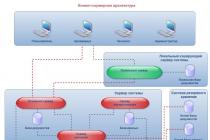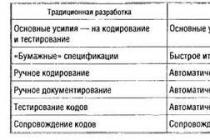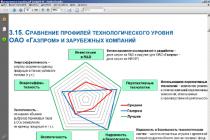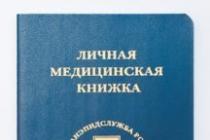SP 2.3.6.1066-01 Sanitary and epidemiological requirements for trade organizations and the turnover of food raw materials and food products
I approve
Chief State
sanitary doctor
Russian Federation,
First Deputy
Minister of Health
Russian Federation
G.G. ONISCHENKO
September 6, 2001
Date of introduction: from January 1, 2002
2.3.5. TRADING ENTERPRISES
SANITARY AND EPIDEMIOLOGICAL REQUIREMENTS
TO TRADING ORGANIZATIONS AND THEIR TURNOVER
FOOD RAW AND FOOD PRODUCTS
Sanitary and epidemiological rules
SP 2.3.6.1066-01
11. Hygiene requirements for food transportation
11.1. Specially designed or specially equipped vehicles are used for the transportation of foodstuffs. Transportation of food products together with non-food products is not allowed.
For transportation a certain kind food products (dairy, sausage, cream confectionery, bread, meat, fish, semi-finished products) specialized transport should be allocated, labeled in accordance with the transported products.
11.2. Vehicles used to transport food products must have a sanitary passport issued in accordance with the established procedure, be clean and in good condition. The inner surface of the car body must have a hygienic coating that can be easily washed and disinfected.
11.3. The driver - forwarder (forwarder), the driver - loader must have a personal medical book of the established sample, work in overalls, strictly observe the rules of personal hygiene, ensure the safety, quality, safety and rules of transportation (unloading) of food products.
11.4. Transportation conditions (temperature, humidity) must comply with the requirements of regulatory and technical documentation for each type of food products, as well as the rules for the transportation of perishable goods different kind transport.
Transportation of perishable food products is carried out by specialized refrigerated or isothermal transport.
11.5. Loading and unloading of food products is carried out by personnel in clean sanitary clothing.
11.6. Bread and bakery products must be transported in trays, in special closed vehicles or vans equipped with shelves. It is not allowed to transport bread in bulk.
11.7. Cream confections should be packed in containers or trays with lids, cakes should be supplied in the manufacturer's standard packaging. Transportation of cream confectionery on open sheets or trays is not allowed.
11.8. Live fish is transported in vehicles - tanks with thermal insulation, having a device for cooling water, as well as equipment for saturating water with air. The temperature of the water in the tank should not exceed 10 degrees. WITH.
11.9. When transporting foodstuffs, the rules for their sequential stacking must be strictly observed, excluding contact between raw and finished products, contamination of products during loading and unloading.
11.10. Vehicles used for the transportation of food products and food raw materials are washed daily with detergents and disinfected monthly with agents authorized by the bodies and institutions of the State Sanitary and Epidemiological Service in the prescribed manner.
.........................................
14.2. Compliance with these sanitary rules is mandatory for individual entrepreneurs and legal entities (Article 39 federal law"On the sanitary and epidemiological well-being of the population" dated March 30, 1999 N 52-FZ, Collection of Legislation of the Russian Federation dated 05.04.99 N 14, art. 1650).
SANITARY REQUIREMENTS FOR THE PRODUCTION, STORAGE, SALES AND QUALITY OF CULINARY PRODUCTS
Obtaining high-quality and safe products is possible only if all sanitary requirements for transportation, reception, storage, culinary processing of products and product sales are observed. Catering.
Transportation of products. The conditions of transportation of food products (raw materials, semi-finished products, culinary products, prepared food, etc.) can significantly affect their quality.
In order to prevent the emergence and spread of mass infectious diseases and food poisoning, transportation of raw materials and food products is carried out by specially designated vehicles. The use of this transport for other purposes is not allowed. Vehicles used for the transportation of food products must comply with sanitary requirements for the arrangement of body equipment, the ability to provide the necessary temperature conditions for products and conduct effective sanitization of the body. Permission to transport certain food products is confirmed by a special document - a sanitary passport of the vehicle, issued by the FGUZ "Center for Hygiene and Epidemiology" in the prescribed manner, but at least once every six months.
Persons with personal medical books with marks of passage are allowed to transport products. medical examinations, the results of laboratory tests and the passage of hygienic training and certification. Persons accompanying food products along the route and performing their loading and unloading must use clean sanitary clothing (robe, gloves, etc.).
The body of the vehicle must be upholstered from the inside with a material that can be easily sanitized, if necessary, equipped with racks, shelves. The food transport vehicle must be clean. Vehicles used for the transport of food raw materials and foodstuffs are washed daily with detergents and regularly treated with approved disinfectants.
Perishable products are transported by refrigerated or isothermal transport, which ensures the preservation of the established this product temperature regime of transportation. A vehicle with an isothermal (heat-insulating) body can be used for intracity transportation of perishable products, but in the warm season only for short distances and in the presence of refrigerant (ice, etc.) in the body. It is more reliable to use refrigerators with a refrigeration unit.
Culinary and confectionery products are transported in vehicles specially designed and equipped for this purpose and labeled and clean containers - containers or trays with lids. Shipping containers are marked in accordance with the regulatory and technical documentation corresponding to each type of product. When transporting food products, the rules of the commodity neighborhood should be observed. Food raw materials and finished products during transportation should not come into contact with each other.
Reception of products. The number of accepted perishable products must correspond to the volume of operating refrigeration equipment.
Incoming products must comply with the requirements of regulatory and technical documentation and be accompanied by documents confirming their origin, quality and safety for human health (veterinary certificates, certificates of quality and safety of a batch of products, etc.).
During the acceptance process, the state of containers, packaging, labeling, the absence of signs of deterioration (foreign smell, etc.) of incoming products are monitored. Food products are accepted in clean, dry containers and packaging without damage. Products are weighed in containers or on clean paper.
To prevent the occurrence and spread of infectious diseases and food poisoning in food establishments, it is prohibited to take:
Food raw materials and food products without documents confirming their origin, quality and safety (quality and safety certificates, sanitary and epidemiological conclusions, etc.);
Meat and offal of all types of farm animals without stamps and veterinary certificates;
Fish, crayfish, poultry without a veterinary certificate;
Ungutted poultry (except game);
Eggs with contaminated shells, with a notch, “tek”, “boy”, as well as eggs from farms that are unfavorable for salmonellosis, duck and goose eggs;
Canned food with a breach in the tightness of cans, bombed (swollen), “hyaopushi”, cans with rust, deformed, without labels;
Cereals, flour, dried fruits and other products infected with granary pests;
Vegetables and fruits with mold and signs of rot;
Mushrooms are inedible, not cultivated edible, wormy, wrinkled;
Food products with expired shelf life and signs of poor quality;
Homemade products.
Disinfection of vehicles for the transport of food products is carried out in order to reliably protect the transported cargo from the possibility of infection. This process is an excellent measure for the prevention of various diseases, because during the processing, dangerous and harmful bacteria, as well as other microflora that can be harmful, are destroyed.
Disinsection of the car: why is it so necessary?
Sanitary disinfection of vehicles in Moscow is necessary not only for those vehicles that transport food, but also for vehicles used in many other areas - we will dwell on this a little later. Let's figure out why the disinfection of a car for transporting products, as well as other cars, is so important:

Disinsection of the machine: features of the procedure
Professional processing provides for specialized equipment for the disinfection of vehicles: it will not work to complete the tasks with improvised means. Preparations for the disinfection of vehicles must also be professional. It is necessary to contact specialists every month - only such a frequency allows you to guarantee the safety of cargo and people from infection. It must be remembered that bacteria and infections can spread in any environment, regardless of whether it is a regular car body or a freezer.
The treatment process can be carried out both completely and partially, for example, disinfection of the car body or interior of the car separately. All vehicles can undergo the procedure, regardless of the brand, model and modification - cars, trucks, trucks and even special equipment. Dimensions for processing specialists do not matter. As a result of the procedure, the owner of the car is provided with an act of disinfection of vehicles.
Car disinfection: which cars should be treated?
All companies whose field of activity lies in the transportation of goods or the transportation of people must promptly carry out such a procedure as disinfecting the car body. The car body is an ideal environment for the development of the spread of pathogenic and dangerous bacteria, contact with which can harm any cargo, and even more so for a person.
Disinfection of the machine is a process that is necessary in the following areas of work:
- Passenger Transportation;
- transportation of food and drinking water;
- transportation medicines and household chemicals;
- transportation of sick and dead people;
- transportation of animals;
- transportation of waste and garbage.
Disinfection of vehicles for the transport of products, as well as any other Vehicle- This is an event that is carried out taking into account the standards established by the sanitary service. Any vehicle must have a specialized passport, which marks the timely completion of the sanitation process. 
If the driver does not have such documents as a passport, an act and a certificate of disinfection of the car body, he may face a variety of sanctions, the most common of which is a fine. For some activities, such as transporting food and water, monthly sanitation is required.
Certificate of disinfection: how to get it, and how is sanitization performed?
In order to obtain an act of car disinfection at the initial stage, you will need to apply for sanitization. Contact only professional companies which guarantee reliable and high-quality work. Remember: the procedure includes several mandatory steps:
- measures for cleaning the cabin and body of the vehicle;
- washing work on the inner surface of the machine, after - its outer surface;
- drying;
- procedures for internal disinfection;
- when applying for the first time - issuing a passport;
- filling out an act on the disinfection of vehicles and putting marks in the passport.
If you are interested in such a procedure as disinfection of a vehicle, and you want to use this service, consult in advance on the individual nuances. You can do this by talking to qualified specialists, such as representatives of our company. They will not only give you complete and detailed information, but also answer all your questions and help you choose the right company.
(extract from the sanitary and epidemiological rules " Sanitary and epidemiological requirements for trade organizations and the turnover of food raw materials and food products in them "SP 2.3.6.1066-01)
1. Specially designed or specially equipped vehicles are used for the transportation of foodstuffs. Transportation of food products together with non-food products is not allowed.
2. Vehicles used to transport food products must have a sanitary passport issued in accordance with the established procedure, be clean and in good condition. The inner surface of the car body must have a hygienic coating that can be easily washed and disinfected.
3. The driver-forwarding agent (forwarder), the driver-loader must have a personal medical book of the established form, work in overalls, strictly observe the rules of personal hygiene, ensure the safety, quality, safety and rules of transportation (unloading) of food products.
4. Transportation conditions (temperature, humidity) must comply with the requirements of regulatory and technical documentation for each type of food products, as well as the rules for the transportation of perishable goods by different modes of transport.
Transportation of perishable food products is carried out by specialized refrigerated or isothermal transport.
5. Loading and unloading of food products is carried out by personnel in clean sanitary clothing.
6. When transporting food products, the rules for their sequential stacking must be strictly observed, excluding contact between raw and finished products, contamination of products during loading and unloading.
7. Vehicles used for the transportation of food products and food raw materials are washed daily with detergents and disinfected monthly with agents authorized by the bodies and institutions of the State Sanitary and Epidemiological Service in the prescribed manner.
© 2008-2019, Department of the Federal Service for
supervision in the field of consumer protection
and human well-being in the Amur Region
Address: 675002, Blagoveshchensk, st. Pervomayskaya, house 30
Vehicle disinfection
Processing procedure
- Quality assurance.
Not a single car wash and / or self-washing a car will give such results that the Dezgarant company guarantees.
Related articles:
A huge number of vehicles need regular disinfection. And these are not only ambulances, but also passenger vehicles, trucks, highly specialized vehicles, etc. Yes, and with mileage, a purchased car can be cleaned of unnecessary microorganisms that could have remained from previous owners.
In addition, the State Sanitary and Epidemiological Supervision and the traffic police regularly check trucks for compliance with sanitary requirements. According to these requirements, disinfection of vehicles should be carried out monthly.
Processing procedure
The whole process of disinfection of vehicles in Moscow includes several main stages:
- Standard washing of the body and interior: using a vacuum cleaner, cleaning panels, washing thresholds, washing the body using special detergents.
- Internal sanitation. On this stage means that destroy fungus, microbes and bacteria, mold are used. At the same time, these drugs do not harm humans and animals.
- The final stage is drying and airing. This stage may not seem as important as the previous two, but it is not. The fact is that most microbes and bacteria multiply in a humid environment. If the interior is not completely dried, then there is a risk of re-emergence of harmful microorganisms.
Self-disinfection of a car in most cases does not give the desired result, because. In its process, cheap and ineffective chemicals are used. In addition, when drying the interior, microbes from environment, which is fraught with a new infection. That is why the best option when disinfecting cars is the help of professionals.
Passenger transport processing
This mode of transport is one of the most polluted. Every day, hundreds or even thousands of people pass through it, each of which can carry a variety of harmful microorganisms on their clothes and shoes. These bacteria move to furniture upholstery, windows, floors, walls, interbreed among themselves, creating new and stronger representatives of the lower ones.
Professional disinfection of a car has several advantages over self-washing:
- Complete destruction of negative microorganisms and dirt;
- Prevention of the appearance of germs and infections;
- Use of products that are safe for humans and pets;
- Interior cleaning even in hard-to-reach places;
- Quality assurance.
Regarding the second point, it should be added that it is impossible to protect the salon from re-infection while people use it. But you can slow down the very process of development of negative microflora thanks to powerful disinfectants.
Freight transport handling
Transportation of food, furniture must be carried out in accordance with a number of requirements of various authorities. And first of all it concerns the sanitary condition of transport. Food products are demanding cargoes, because food contamination occurs much faster than anything else.
Professional disinfection of transport allows you to solve several problems at once:
- Eliminate food residues, debris from hard-to-reach places;
- Clean all surfaces without exception from harmful microorganisms;
- Dry and ventilate the car in order to avoid re-infection.
Not a single car wash and / or self-washing a car will give such results that the Dezgarant company guarantees.
Don't put off solving the problem!
Fill out an application or get a consultation by phone
Sanitization of vehicles for the transport of products
CHIEF STATE SANITARY PHYSICIAN FOR THE SMOLENSK REGION
ABOUT DISINFECTION OF VEHICLES USED FOR FOOD TRANSPORTATION
I, the Chief State Sanitary Doctor for the Smolensk Region, Krutilin V.E., having analyzed the materials of the state sanitary and epidemiological supervision of public catering organizations, trade and the circulation of food raw materials and food products in them in the Smolensk Region, found that the majority of legal entities and individual entrepreneurs in violation of clause 11.10 of the Sanitary Rules SP 2.3.6.1066-01 “Sanitary and epidemiological requirements for trade organizations and the circulation of food raw materials and food products in them”, disinfection of vehicles used for the transportation of food products and food raw materials is not organized and is not carried out. This is contrary to the requirements of paragraph 5 of Art. 15 of the Federal Law "On the sanitary and epidemiological well-being of the population" dated March 30, 1999 N 52-FZ, paragraph 4. Art. 19 of the Federal Law "On the Quality and Safety of Food Products" of 02.01.2000 N 29-FZ and creates a threat of the emergence and spread of infectious diseases.
In order to eliminate the threat of the emergence and spread of infectious diseases in the territory of the Smolensk region, in accordance with the Federal Law "On the sanitary and epidemiological welfare of the population" dated March 30, 1999 N 52-FZ, I decide:
1. For legal entities and individual entrepreneurs operating in the Smolensk region and transporting food products and food raw materials, organize and carry out in accordance with the requirements of the Sanitary and Epidemiological Rules SP 3.5.1378-03 "Sanitary and epidemiological requirements for the organization and implementation of disinfection activities ” and within the time limits established by SP 2.3.6.1066-01 “Sanitary and epidemiological requirements for trade organizations and the circulation of food raw materials and food products in them”, measures for the disinfection of vehicles used by them to transport food raw materials and food products. If it is impossible to organize appropriate disinfection measures, ensure that disinfection is carried out under contracts with other legal entities or individual entrepreneurs that disinfect vehicles.
2. Recommend to legal entities and individual entrepreneurs providing vehicle washing services to organize and carry out measures for the disinfection of vehicles used for transportation that meet the requirements of the Sanitary and Epidemiological Rules SP 3.5.1378-03 "Sanitary and Epidemiological Requirements for the Organization and Implementation of Disinfection Activities" food raw materials and food products.
3. Legal entities and individual entrepreneurs who carry out measures for the disinfection of vehicles must ensure:
Obtaining in the approved manner (clause 4 of this resolution) a sanitary and epidemiological conclusion on the compliance of the conditions for carrying out disinfection measures with the requirements of SP 3.5.1378-03 "Sanitary and epidemiological requirements for the organization and implementation of disinfection activities";
Professional training of personnel carrying out the disinfection of vehicles;
Keeping a register of the disinfection of vehicles used for the transport of food products, in accordance with the established form;
Entering by the personnel who carried out the disinfection of vehicles, information about the disinfection in the sanitary passport for vehicles and gluing a special holographic mark.
4. Approve the following procedure for issuing sanitary and epidemiological conclusions on the compliance of the conditions for carrying out disinfection of vehicles with the requirements of SP 3.5.1378-03 "Sanitary and epidemiological requirements for the organization and implementation of disinfection activities":
4.1. Legal entities and individual entrepreneurs planning to organize measures for the disinfection of vehicles submit to the Office of Rospotrebnadzor for the Smolensk Region (214018, Smolensk, Tenisheva St., 26, tel. 38-25-10, hereinafter referred to as the Office), or to its respective territorial departments (215110, Vyazma, Herzen St., 16, tel. 6-13-46, 215010, Gagarin, Gertsena St., 4, tel. Tvardovskogo, 8, phone 4-13-32, 216500, Roslavl, Kalyaeva street, 70, phone 4-17-38, 215500, Safonovo, Oktyabrskaya street, 68, phone 3-49 -36, 216200, Dukhovshchina, Sovetskaya St., 29, tel.: 4-11-48, in Yartsevo - tel. compliance with the conditions for carrying out measures for the disinfection of vehicles with the requirements of SP 3.5.1378-03 "Sanitary and epidemiological requirements for the organization and implementation of disinfection activities", with the application of a package of documents, which includes:
Act of sanitary and epidemiological examination of the conditions for carrying out measures for the disinfection of vehicles;
Program production control for measures for the disinfection of vehicles, drawn up in accordance with the Sanitary Rules SP 1.1.1058-01 "Organization and implementation of production control over compliance with sanitary rules and the implementation of sanitary and anti-epidemic (preventive) measures";
A copy of the contract with a duly accredited laboratory for laboratory research for the purpose of production control (only for legal entities and individual entrepreneurs who do not have their own accredited laboratories);
Copies of certificates of vocational training vehicle disinfection personnel.
4.2. The Department, its territorial departments consider the submitted documents, within 30 days from the date of their receipt, draw up on a standard form and issue a sanitary and epidemiological conclusion on the compliance of the conditions for carrying out disinfection of vehicles with the requirements of SP 3.5.1378-03 "Sanitary and epidemiological requirements for the organization and implementation of disinfection activities. The reasons for issuing a negative sanitary-epidemiological conclusion are communicated to the applicant in writing.
4.3. Territorial departments copies of positive sanitary and epidemiological conclusions are sent to the department of epidemiological surveillance of the Office within 3 days from the date of issue.
5. Assign to the Department of Epidemiological Surveillance of the Office:
Organization of work on consideration of applications received by the Department, execution and issuance of sanitary and epidemiological conclusions on the compliance of the conditions for carrying out disinfection of vehicles with the requirements of SP 3.5.1378-03 "Sanitary and epidemiological requirements for the organization and implementation of disinfection activities";
Maintaining a register of legal entities and individual entrepreneurs operating on the territory of the Smolensk region and carrying out measures to disinfect vehicles.
6. Federal State Health Institution "Center for Hygiene and Epidemiology in the Smolensk Region":
Organize and conduct sanitary and epidemiological examinations of the compliance of the conditions for carrying out disinfection of vehicles with the requirements of SP 3.5.1378-03 "Sanitary and epidemiological requirements for the organization and implementation of disinfection activities";
Count prerequisite issuance to legal entities and individual entrepreneurs of a sanitary passport for transport used for the transportation of food raw materials and food products, the availability of a sanitary and epidemiological conclusion on the compliance of the conditions for carrying out disinfection of vehicles with the requirements of SP 3.5.1378-03 "Sanitary and epidemiological requirements for the organization and implementation of disinfection activities” or a contract for the disinfection of vehicles.
7. Approve the attached Instructions for the disinfection of vehicles used for the transportation of food raw materials and food products.
8. Charitable Foundation sanitary and epidemiological welfare of the population of the Smolensk region:
Provide methodological guidance and advice on disinfection of vehicles;
To provide legal entities and individual entrepreneurs carrying out measures for the disinfection of vehicles, on a contractual basis at their request, with special holographic stamps for sanitary passports.
9. Management state inspection security traffic The Department of Internal Affairs of the Smolensk Region should be recommended to inform the personnel that the absence of information on disinfection in the sanitary passport for vehicles used to transport food products is a violation of paragraph 4 of Art. 19 of the Federal Law "On the Quality and Safety of Food Products" of 02.01.2000 N 29-FZ.
10. To impose control over the execution of this resolution on the deputy head of the Department, Rogutsky S.V.
Application. INSTRUCTIONS FOR DISINFECTION OF VEHICLES USED FOR TRANSPORTATION OF FOOD RAW AND FOOD PRODUCTS
Application
to the decision
chief state
sanitary doctor
in the Smolensk region
dated 26.09.2007 N 15
This Instruction has been developed in accordance with the requirements of paragraph 5 of Art. 15 of the Federal Law "On the sanitary and epidemiological well-being of the population" dated March 30, 1999 N 52-FZ, paragraph 4 of Art. 19 of the Federal Law “On the Quality and Safety of Food Products” dated 02.01.2000 N 29-FZ, clause 11.10 SP 2.3.6.1066-01 “Sanitary and epidemiological requirements for trade organizations and the circulation of food raw materials and food products in them”, based on Sanitary and epidemiological rules SP 3.5.1378-03 "Sanitary and epidemiological requirements for the organization and implementation of disinfection activities."
1. The instruction is intended for legal entities and individual entrepreneurs engaged in the disinfection of vehicles used for the transportation of food raw materials and food products (hereinafter referred to as vehicles).
2. In accordance with clause 2.2 of the Sanitary and Epidemiological Rules SP 3.5.1378-03 "Sanitary and Epidemiological Requirements for the Organization and Implementation of Disinfection Activities", disinfection of vehicles is allowed if there are sanitary and epidemiological conclusions.
3. In accordance with paragraph 4.2 of the Sanitary Rules SP 1.1.1058-01 "Organization and conduct of production control over compliance with sanitary rules and the implementation of sanitary and anti-epidemic (preventive) measures", when carrying out disinfection of vehicles, it is necessary to provide for monitoring the effectiveness of the disinfectants used , compliance with the requirements for their use, storage, transportation and disposal. At the same time, in accordance with paragraph 1. Art. 42 of the Federal Law "On the sanitary and epidemiological well-being of the population" dated 30.03.1999 N 52-FZ and clause 2.3 of the Sanitary Rules SP 1.1.1058-01 "Organization and conduct of production control over compliance with sanitary rules and the implementation of sanitary and anti-epidemic (preventive) measures » laboratory research(tests) are carried out in duly accredited laboratories.
4. The disinfection of vehicles is carried out by personnel who have undergone special professional training.
5. Only thoroughly washed vehicles are subject to disinfection.
6. For the disinfection of vehicles, disinfectants are used that are specially designed for this type of disinfection work, having a certificate of conformity and a certificate of state registration.
7. Disinfectants are applied in accordance with guidelines for their use, with due regard for precautions.
8. After disinfection, the personnel who carried out the treatment must enter the relevant information in the Vehicle Disinfection Record Book (form attached) and in the sanitary passport for vehicles, and also paste a special holographic mark into the sanitary passport.
Application. Log book for the disinfection of vehicles used for the transport of food products
Application
to the Instruction
for the disinfection of vehicles,
used for transportation
food raw materials
and food
Name legal entity or individual entrepreneur, carrying out activities for the disinfection of vehicles, its legal address, number and date of issue of the sanitary and epidemiological conclusion on the activities for the disinfection of vehicles. Location (address) of the disinfection point. FULL NAME. person responsible for the disinfection of vehicles
Information about the disinfection of vehicles
date
holding
disinfection
Name
legal
face,
individual
entrepreneur,
implementing
transportation
food
products
Information about transport
means, kind
transported products
information about sanitary
passport
Name
disinfection
facilities,
concentration
FULL NAME.,
signature
face,
who conducted
disinfection
Buy a sanitary passport for a car. The act of disinfection of vehicles.
Sanitary passport for a car registration and delivery of a sanitary passport for vehicles in Moscow and the region within 24 hours
ATTENTION! motor vehicle license canceled
The documents required for inspections at the present time - an act and a certificate of disinfection of vehicles can be ordered from our company
Changes in the wording of Federal Law N 29-FZ "On the Quality and Safety of Products", effective from October 21, 2011, abolished the mandatory presence of a previously approved sanitary passport for a vehicle for transporting products. But the responsibility for the safety of transported products remained on the conscience of the owners transport companies and private carriers. Now, in order to confirm the sanitary cleanliness and safety of the car, the driver must present another document - an act of disinfection of vehicles.
Why do you need a license for a car?
Only has legal force Sanitary passport for a car for transporting products received in specialized company whose right to perform sanitary and epidemiological work is confirmed by a license.
Car disinfection is a complex disinfection of a vehicle with the help of chemicals and special equipment. Sanitary passport for vehicles confirms the disinfection
What does vehicle disinfection achieve?
The fact of possessing a sanitary disinfection certificate for a vehicle confirms that the owner of the car (or the transport company) professionally took care of the sanitary condition of the car and provided the recommended parameters for the safe transportation of food products.
Who can request a sanitation certificate for disinfection?
The driver of a vehicle transporting food products is required to present a disinfection passport both at the request of the traffic police inspector performing a scheduled road check of the car, and at the request of Rospotrebnadzor employees.
In addition, they may be interested in the availability of this document at the destination. The company receiving foodstuffs, may also require the presentation of a sanitary passport of the vehicle. In case of its absence, it is possible to refuse to accept food products transported in a car that has not undergone appropriate sanitization.
It should be noted that despite some complexity of the vehicle disinfection procedure, due to the use of modern equipment, today they can be performed without significant flight delays.
Transport company owners should be aware that cancellation of the sanitary passport does not relieve them of responsibility for the quality of the transported goods.
You may also be interested
The sanitary passport of the enterprise is an officially approved document confirming the proper sanitary and epidemiological condition of the premises under study.
Registration of notifications of the start of implementation certain types entrepreneurial activity carried out in accordance with administrative regulations providing Federal Service on supervision in the field of consumer protection.
Sanitary and epidemiological conclusion (SEZ) - a document certifying the compliance or non-compliance with sanitary rules of environmental factors, economic and other activities, products, works, services; buildings, structures, structures, premises, equipment and other property that the applicant intends to use in the course of his business activities.
Project
RUSSIAN FEDERATION
THE FEDERAL LAW
SPECIAL TECHNICAL REGULATIONS
On the requirements for vehicles intended for
for the transport of perishable foodstuffs
CHAPTER I. GENERAL PROVISIONS
Article 1. Purposes of the law
The objectives of this law are to ensure the protection of the life or health of citizens, as well as the prevention of actions that mislead purchasers of vehicles intended for road transport perishable food products.
Article 2. Scope of application of the law
1. This law regulates relations in the field of implementation mandatory requirements to the safety of vehicles intended for the road transport of perishable foodstuffs, as well as in the field of conformity assessment.
2. This law applies to the following isothermal vehicles:
3. This law does not apply to vehicles intended for international road transport of perishable foodstuffs carried out in accordance with international treaties of the Russian Federation.
Article 3. Rules for the identification of isothermal vehicles
1. The identification of insulated vehicles for the purposes of the application of this Regulation shall be made by comparing documentary and actual identification data.
2. The identification data of insulated vehicles include the name, brand, model, an identification number, category, species, class and identification letter.
3. Documentary identification data of insulated vehicles must be determined on the basis of the vehicle passport, declaration of conformity, certificate of conformity and test report.
4. The actual identification of insulated vehicles must be determined by testing and/or visual inspection.
Article 4. Basic concepts
For the purposes of this law, the concepts established in (as amended on May 7, 2007), as well as the following concepts, apply:
Isothermal vehicles- vehicles with or without thermal equipment, the body of which consists of thermally insulating walls, including floors, roofs and doors, to limit heat transfer between the inner and outer surfaces of the body. The term "body" of a tank truck, tank trailer and tank semi-trailer means the insulated tank itself.
Perishable food products- food products that require compliance with special temperature and other regimes, without which they lose their quality and safety due to irreversible changes that are harmful to human life and health. Perishable food products also include especially perishable food products that cannot be stored without cold and are intended for short-term sale.
Overall heat transfer coefficient- a characteristic of the isothermal properties of the vehicle, defined as the ratio of the heat flow through the walls of the body to the difference between the internal and external temperatures of the body and to its surface area.
Efficiency thermal equipment for cooling or heating- the ability to maintain a given temperature inside the body of an isothermal vehicle at a given outside temperature.
Type sample- a vehicle selected for testing that does not have significant differences from mass-produced isothermal vehicles in terms of design, isothermal properties and efficiency of thermal equipment for cooling or heating.
Article 5. Classification of insulated vehicles
1. The classification necessary for the adoption of the safety requirements and identification of insulated vehicles referred to in Article 2, paragraph 2, is carried out according to the following classification criteria: structural design, isothermal properties and efficiency of thermal equipment for cooling or heating.
2. By design, insulated vehicles are divided into the following types:
I - isothermal vehicle without thermal equipment;
R - glacier - an isothermal vehicle that allows you to lower the temperature inside an empty body and maintain it within limits not exceeding a given level, using thermal equipment that does not have a mechanical compressor or adsorption unit, but contains natural ice with or without the addition of salt; eutectic plates; dry ice with or without a device to control its sublimation; liquefied gas with or without an evaporation control device, etc.);
F - refrigerator - an isothermal vehicle with thermal equipment (mechanical compressor unit, absorption unit, etc.), which allows you to set and constantly maintain a predetermined temperature inside an empty body;
C - heated vehicle - an isothermal vehicle with thermal equipment for heating, which allows, at a negative outside temperature, to increase and maintain a given positive temperature inside an empty body for a given time without additional heat input.
3. According to the isothermal properties that meet the requirements established in Article 7, isothermal vehicles are divided into the following categories:
N - vehicle with normal insulation;
R - vehicle with reinforced insulation.
4. According to the efficiency of thermal equipment for cooling or heating, in accordance with the requirements set out in Article 8, insulated vehicles are divided into the following classes: A, B, C, D, E and F.
Article 6. Legislation of the Russian Federation in the scope of this technical regulation
Within the scope of this technical regulations The following legislative acts are necessary to fulfill its requirements:
Federal Law No. 184-FZ of December 27, 2002 “On Technical Regulation” (as amended on May 7, 2007);
Federal Law No. 134-FZ of August 8, 2001 "On the Protection of the Rights of Legal Entities and Individual Entrepreneurs during State Control (Surveillance)" (Sobraniye Zakonodatelstva Rossiyskoy Federatsii, 2001, No. 33, Art. 3436; 2002, No. 44, Art. 4297; 2003, N 2, item 169; N 40, item 3820; 2004, N 35, item 3607; 2005, N 19, item 1752; N 27, item 2719);
Agreement on the International Carriage of Perishable Foodstuffs and on Special Vehicles Designed for These Carriages (hereinafter referred to as ATP), adopted on September 1, 1970 and entered into force on November 21, 1976
CHAPTER 2. SAFETY REQUIREMENTS FOR ISOTHERMAL VEHICLES
Article 7. Requirements for isothermal properties
1. The overall heat transfer coefficient, determined in accordance with Appendix 1, must not exceed the following values:
0.7 W/m()(.)()K for vehicles with normal insulation;
0.4 W/m()(.)()K for vehicles with reinforced insulation.
2. The thickness of the thermally insulating side walls of the body of insulated vehicles with reinforced insulation, having a width of more than 2.5 m, must be at least 45 mm.
Article 8 Efficiency requirements for thermal equipment for cooling or heating
1. Class A glaciers with normal or reinforced insulation must ensure that the temperature inside the body does not exceed +7 degrees Celsius at an average outside temperature of +30 degrees Celsius.
2. Glaciers of class B with reinforced insulation must ensure that the temperature inside the body does not exceed -10 degrees Celsius at an average outside temperature of +30 degrees Celsius.
3. Class C glaciers with reinforced insulation must ensure that the temperature inside the body does not exceed -20 degrees Celsius at an average outside temperature of +30 degrees Celsius.
4. Class D glaciers with normal or reinforced insulation must ensure that the temperature inside the body does not exceed 0 degrees Celsius at an average outside temperature of +30 degrees Celsius.
5. Class A refrigerators with normal or reinforced insulation must ensure that the temperature inside the body is maintained within the range of +12 to 0 degrees Celsius at an average outside temperature of +30 degrees Celsius.
6. Class B refrigerators with reinforced insulation must ensure that the temperature inside the body is maintained within the range of +12 to -10 degrees Celsius at an average outside temperature of +30 degrees Celsius.
7. Class C refrigerators with reinforced insulation must ensure that the temperature inside the body is maintained within the range of +12 to -20 degrees Celsius at an average outside temperature of +30 degrees Celsius.
8. Class D refrigerators with normal or reinforced insulation must ensure that the temperature inside the body does not exceed 0 degrees Celsius at an average outside temperature of +30 degrees Celsius.
9. Class E refrigerators with reinforced insulation must ensure that the temperature inside the body does not exceed -10 degrees Celsius at an average outside temperature of +30 degrees Celsius.
10. Class F refrigerators with reinforced insulation must ensure that the temperature inside the body does not exceed -20 degrees Celsius at an average outside temperature of +30 degrees Celsius.
11. Class A heated vehicles with normal and reinforced insulation must ensure that the temperature inside the body is maintained at least +12 degrees Celsius at an average outside temperature of -10 degrees Celsius for at least 12 hours.
12. Class B heated vehicles with reinforced insulation must ensure that the temperature inside the body is maintained at least +12 degrees Celsius at an average outside temperature of -20 degrees Celsius for at least 12 hours.
Article 9. Prevention of actions that mislead purchasers of insulated vehicles
1. In the instruction or operating manual attached to the product, the manufacturer is obliged to provide the purchaser with information containing the rules for ensuring the safety of insulated vehicles during operation, including during repair and maintenance.
2. Isothermal vehicles that comply with this Regulation are marked with a market circulation mark and identification letters, including the category, type and class of the isothermal vehicle.
3. Identification letter designations must comply with the requirements established in Appendix 2.
CHAPTER 3. FEATURES OF CONFORMITY ASSESSMENT OF ISOTHERMAL VEHICLES
Article 10. Forms of conformity assessment of insulated vehicles
To determine compliance with the requirements of this regulation, the following forms of conformity assessment are used:
declaration of conformity;
periodic testing of insulated vehicles;
state control (supervision).
Article 11 Declaration of Conformity
1. Declaration of conformity of products at the stage of release into circulation on the territory of the Russian Federation is carried out according to the scheme for the applicant to accept a declaration of conformity based on his own evidence and evidence obtained during tests conducted by an accredited testing laboratory.
2. When declaring conformity, applicants are manufacturers or sellers registered in accordance with the legislation of the Russian Federation on its territory as a legal entity or individual entrepreneur, as well as persons performing the functions of a foreign manufacturer.
3. Tests for the purposes of declaring conformity are carried out on each single released sample or on one type sample from each batch of 100 units of mass-produced isothermal vehicles of the same type.
4. If the total number of serially produced insulated vehicles of the same type for any 3 years is less than 100 units, tests for the purposes of declaring conformity are carried out on one type sample from the specified number.
5. Tests for the purposes of declaring conformity are carried out by accredited testing laboratories on the terms of an agreement with applicants.
6. The procedure and methods of testing, as well as the forms of test reports for insulated vehicles for the purposes of declaring conformity, must comply with the requirements of the ATP.
7. For the adoption of a declaration of conformity, test reports of insulated vehicles issued outside the Russian Federation and complying with the requirements of the Union of Right Forces are recognized.
8. Declaration of conformity, drawn up in the prescribed manner, must contain the following additional information:
type, category and class of the insulated vehicle, in accordance with paragraphs 2 - 4 of Article 5 of this regulation;
identification letter in accordance with paragraph 3 of article 9 of this regulation.
9. Validity of the declaration of conformity is 3 years.
10. The applicant who has accepted the declaration of conformity is obliged to ensure the conformity of each unit of manufactured products type sample, for which the test report has been issued, and also mark it with the mark of circulation on the market and identification letters in accordance with the requirements of Appendix 2.
Article 12. Periodic tests of insulated vehicles in service
1. Isothermal vehicles in operation on the territory of the Russian Federation and duly registered are subject to conformity assessment in the form of periodic tests.
3. Responsibilities for the submission of vehicles for periodic testing within the established time limits are assigned to the owners of vehicles registered in accordance with the legislation of the Russian Federation on its territory as a legal entity or an individual entrepreneur, or persons on behalf of the owners owning, using and (or) disposing vehicles in accordance with the procedure established by the civil legislation of the Russian Federation (hereinafter referred to as owners (representatives of owners).
5. Periodic tests of insulated vehicles are carried out by accredited testing laboratories on the terms of an agreement with the owners (representatives of owners) of insulated vehicles.
6. Periodic tests of isothermal vehicles are carried out once every three years.
7. The procedure and methods for testing insulated vehicles, as well as periodic test reports must comply with the requirements of the ATP.
8. Compliance of insulated vehicles with the requirements of this technical regulation is confirmed by a certificate of conformity issued by testing laboratories.
The certificate of conformity includes:
name and location of the owner (representative of the owner) of the isothermal vehicle;
name and location of the manufacturer of the isothermal vehicle;
name and location of the testing laboratory that issued the certificate of conformity;
information about the isothermal vehicle, allowing to identify it;
statement of the testing laboratory on the compliance of the isothermal vehicle with the requirements of this regulation;
information about the periodic tests carried out;
validity period of the certificate of conformity.
The form of the certificate of conformity is approved by the federal authority executive power in the field of transport.
9. For newly manufactured insulated vehicles, registered for the first time in the territory of the Russian Federation, accredited testing laboratories issue certificates of conformity if there is a declaration of conformity without additional periodic tests.
10. Validity of the certificate of conformity is 3 years.
11. The owner (representative of the owner) is obliged to mark the insulated vehicle, for which a certificate of conformity has been issued, with identification letters in accordance with the requirements of Appendix 2.
12. The federal executive authority in the field of transport conducts single register issued certificates of conformity.
13. The procedure for maintaining a unified register of certificates of conformity is established by the Government of the Russian Federation.
14. The procedure for transferring information about issued certificates of conformity to the unified register of issued certificates of conformity is established by the federal executive body in the field of transport.
Article 13. Features of state control (supervision) over compliance with the requirements of this regulation
State control (supervision) over compliance with the requirements of this regulation is carried out by the federal executive body in the field of transport and its subordinate government agencies(hereinafter referred to as state control bodies).
CHAPTER 4. FINAL AND TRANSITIONAL PROVISIONS
Article 14. Transitional provisions
Mandatory confirmation of conformity by adopting a declaration of conformity and periodic tests are carried out in relation to insulated vehicles put into circulation on the territory of the Russian Federation after the date of entry into force of this regulation
Article 15. Entry into force of this regulation
This Regulation shall enter into force six months after the date of its official publication.
Annex 1. General heat transfer coefficient
Annex 1
The overall heat transfer coefficient is determined using the following formula:
As appropriate, either the heating power or the cooling capacity required to maintain, at constant operation, the absolute difference between the average inside temperature and the average outside temperature when the average outside temperature is constant, for a body whose average surface area is ;
- the average surface area of the body is equal to the geometric average area of the inner surface and the area outer surface bodywork:
Units of measurement of physical quantities given in the formulas:
thermal power, cooling capacity - watt (W);
surface area - square meter (m);
temperature - degrees Kelvin (K);
total heat transfer coefficient - W/m()(.)()K.
Annex 2. Identification letters for isothermal vehicles
Annex 2
1. Isothermal vehicles that meet the requirements of this regulation are marked with the following identification letters:
IN - isothermal vehicle with normal insulation |
IR - isothermal vehicle with reinforced insulation |
RNA - glacier with normal insulation class A |
RRA - glacier with reinforced insulation class A |
RRB - class B reinforced insulation glacier |
RRC - glacier with reinforced insulation class C |
RND - glacier with normal insulation class D |
RRD - Class D Reinforced Glacier |
FNA - Class A Normal Insulated Refrigerator |
FRA - Class A Reinforced Insulated Refrigerator |
FRB - Class B Reinforced Insulated Refrigerator |
FRC - Class C Reinforced Insulation Refrigerator |
FND - refrigerator with normal class D insulation |
FRD - Class D Reinforced Insulated Refrigerator |
FRE - Class E Reinforced Insulation Refrigerator |
FRF - Class F Reinforced Insulation Refrigerator |
CNA - heated vehicle with normal insulation class A |
CRA - Class A heated vehicle with reinforced insulation |
CRB is a class B heated vehicle with reinforced insulation. |
2. Identification letters of isothermal vehicles shall be applied in capital Latin letters in blue on a white background on both outer sides of the body in the upper corners near the front. The height of the letters must be at least 100 mm.
For isothermal vehicles, the maximum mass of which does not exceed 3.5 tons, the height of the letters may be 50 mm.
3. Under the identification letters of insulated vehicles, the date of expiration of the certificate of conformity is applied (month, year) Arabic numerals blue on a white background. The height of the numbers should be equal to half the height of the identification lettering of isothermal vehicles.
EXPLANATORY NOTE to the draft federal law of the special technical regulation "On the requirements for vehicles intended for the transport of perishable food products"
The draft special technical regulation "On the requirements for vehicles intended for the transport of perishable food products" was developed in the form of a federal law in accordance with the requirements of the federal law "On technical regulation" of December 27, 2002 N 184-FZ (as amended on May 7, 2007 .).
The basis for the development of this draft regulation is the Program for the development of technical regulations, approved by the order of the Government of the Russian Federation dated May 29, 2006 N 781-r.
The need to develop a special technical regulation "On the requirements for vehicles intended for the transport of perishable food products" is due to the following reasons.
In the technological chain from production to consumption of perishable food products, the processes of transportation, in contrast to the processes of their processing and storage in equipped stationary premises, pose a particular danger, depending on the characteristics of vehicles that must provide the necessary temperature conditions in the food zone ranging from - 20 up to +15 degrees Celsius when exposed to highly variable conditions external environment.
The use of vehicles that do not ensure compliance with the required temperature regimes when transporting perishable food products causes significant risks of harm to human health and life due to possible illness, poisoning or death from the consumption of low-quality and dangerous products.
According to the Ministry of Industry and Energy of Russia, in the course of state control and supervision in the field of compliance with mandatory requirements for products in 2003, it was revealed that the main violations relate to products Food Industry(33.9%). At the same time, 67 cases of poisoning and mass non-communicable diseases, 9273 cases of outbreaks of intestinal infections were identified. Based on the results of the control, 60,062 orders were issued to ban the sale of products, and violators were fined 399.1 million rubles.
A significant proportion of these cases of loss of food quality relate to transportation processes, which, due to the lack of relevant mandatory requirements for inland transport, are often carried out without observing the required temperature regimes.
Currently, in our country, legal regulation is being carried out with respect to isothermal vehicles intended for international road transport of perishable food products, and the following apply for this regulations:
1. International treaty of the Russian Federation - "Agreement on the international transportation of perishable food products and on special vehicles intended for these transportations" (SPS), adopted on September 1, 1970 and entered into force on November 21, 1976
2. Domestic legal acts necessary for the application of the ATP: Decree of the Government of the Russian Federation of June 8, 2001 N 788-r, Decree of the Government of the Russian Federation of July 30, 2004 N 395 and Order of the Ministry of Transport of Russia of April 27, 2002 N 56 .
By these documents, the Ministry of Transport of Russia has been appointed the competent authority for the fulfillment of obligations arising from international treaties of the Russian Federation in the field of road transport, including the ATP, which issues a document of conformity of vehicles established requirements(Certificate of ATP), recognizes the competence (carries out accreditation) of testing stations, expert organizations and experts.
Federal Laws of March 30, 1999 N 52-FZ "On the sanitary and epidemiological well-being of the population" (Collected Legislation of the Russian Federation, 2000, N 2, Art. 150; 2003, N 2, Art. 167; N 27, Art. 2700 ; 2004, N 35, item 3607; 2005, N 19, item 1752) it is established that the transportation of food products must be carried out by specialized refrigerated or isothermal transport, however, mandatory requirements for such transport intended for domestic transportation have not been established and legal regulation has not yet been carried out due to the lack of a relevant legislative act.
In economically developed countries, the control and examination of vehicles intended for international transport perishable foodstuffs is carried out in accordance with the ATP international agreement, which is currently a party to 40 countries, including Russia, the USA, Canada, the countries of the European Community and a number of CIS countries.
Control and certification of vehicles intended for domestic transportation of perishable food products in these countries, except for Russia and the CIS, is carried out on the basis of national legislative acts that take into account the specifics of domestic distribution transportation, providing for intermediate unloading and distribution of products to customers with a corresponding loss of cold or heat from isothermal body, which makes it difficult to maintain the specified temperature regimes.
The experience of legal regulation economically developed countries within the framework of the ATP and national legislative acts, as well as the requirements of the Federal Law "On Technical Regulation" and the specific conditions for the manufacture and operation of vehicles in our country.
The regulation consists of 4 chapters, 15 articles and 2 annexes.
Chapter 1 establishes: the purpose and scope of the technical regulation; identification rules using identification details of vehicles and essential features of their main characteristics; classification necessary for the adoption of safety requirements and identification of insulated vehicles; basic concepts. In addition, the legislation of the Russian Federation is given in the scope of the technical regulation, which is necessary to fulfill its requirements.
The purpose of the regulation is to ensure the protection of the life and health of citizens, as well as the prevention of actions that mislead purchasers in the sale and operation of insulated vehicles.
This goal is achieved by establishing and complying with mandatory requirements for vehicles intended for the domestic transportation of perishable food products, aimed at reducing the risks of harm to human life and health associated with biological and chemical hazards.
The objects of technical regulation of the specified regulation are the following isothermal vehicles intended for domestic road transport of perishable food products:
specialized vans (OKP code 45 2110, TN VED code 8704);
tank trucks (OKP code 45 2140, TN VED code 8704);
trailers with specialized bodies (OKP code 45 2580, TN VED code 8716);
semi-trailers with specialized bodies (OKP code 45 2630, TN VED code 8716);
tank trailers and tank semi-trailers (OKP code 45 2550, TN VED code 8716).
The regulation governs relations arising from the fulfillment of mandatory requirements for vehicles intended for the domestic road transport of perishable food products, as well as during conformity assessment specified requirements.
The regulation provides definitions of the following concepts that are necessary for its purposes and are not contained in the Federal Law of December 27, 2002 N 184-FZ “On Technical Regulation” (as amended on May 7, 2007): insulated vehicles; perishable food products; overall heat transfer coefficient; efficiency of thermal equipment for cooling or heating; typical sample.
The definition of perishable food products is given taking into account the federal laws of March 30, 1999 N 52-FZ "On the sanitary and epidemiological well-being of the population" (Collected Legislation of the Russian Federation, 1999, N 14, article 1650) and of January 2, 2000 N 29-FZ "On the quality and safety of food products" (Sobraniye zakonodatelstva Rossiyskoy Federatsii, 2000, N 2, item 150; 2003, N 2, item 167; N 27, item 2700; 2004, N 35, item 3607 ; 2005, N 19, art. 1752), as well as SanPiN 2.3.2.1324-03 adopted in pursuance of these laws (Decree of the Chief Sanitary Doctor of the Russian Federation of May 22, 2003 N98).
Refined definitions of other concepts are given taking into account the SPS. At the same time, instead of the not recommended international system units of the SI definition of "total heat transfer coefficient" used in the ATP, the definition of "total heat transfer coefficient" established by the SI system is applied.
Chapter 2 establishes requirements for the isothermal properties and efficiency of thermal equipment for heating or cooling insulated vehicles, as well as requirements for preventing actions that mislead the purchasers of these vehicles.
To reduce the risk of harm to human health and life at economically acceptable financial and material costs when establishing safety requirements, the fundamental principles of technical regulation were taken into account: compliance of technical regulation with the level of development of the national economy and material and technical base, as well as the level of scientific and technical development of the country.
Accounting for these principles of technical regulation is achieved as follows.
For Russia, where only getting better modern production isothermal vehicles, tightening the requirements for them is impractical, therefore, the regulation should establish uniform safety standards, classification, marking and test methods for all vehicles used for the transportation of perishable food products both in domestic and international transportation.
This will ensure that the same vehicles for both domestic and international transport of perishable foodstuffs can be produced and used, and unnecessary re-testing of vehicles used for these two modes of transport, as well as the associated costs to manufacturers and manufacturers, will be avoided. owners to carry them out.
This also corresponds to the practice of a number of countries (for example, France, Portugal, Spain, etc.), which apply the ATP requirements also for the control of vehicles intended for domestic transport.
Harmonization of the requirements of the regulation with international norms and rules in accordance with the requirements of the Federal Law "On Technical Regulation" and the WTO Agreement on Technical Barriers to Trade, as well as taking into account international practice, will minimize the costs associated with the entry into force of the said regulation, since a functioning at present, the production testing base of expert organizations and attracted specialists (certified experts) who carry out similar activities within the framework of the ATP throughout the Russian Federation.
Chapter 3 establishes the following forms of conformity assessment of isothermal vehicles: declaration of conformity at the stage of release into circulation, periodic tests during the operation of vehicles and state control (supervision).
It has been established that the declaration of conformity of insulated vehicles when released into circulation on the territory of the Russian Federation should be carried out according to the scheme for the applicant to accept a declaration of conformity based on his own evidence and evidence obtained during tests conducted by an accredited testing laboratory.
The choice of this form of conformity assessment is justified by the fact that it is sufficient to achieve the purpose of the regulation and, in addition, corresponds to the world practice of predominantly using the form of declaring conformity as less expensive for applicants compared to mandatory certification.
To ensure the safety of insulated vehicles during operation in accordance with paragraph 3 of Article 7 of the Federal Law “On Technical Regulation”, the following form of conformity assessment has been established: periodic testing of insulated vehicles in operation in accredited testing laboratories with the issuance of a certificate of conformity.
The choice of this form of conformity assessment is fully consistent with modern international practice.
At present, all economically developed countries, including all 40 countries participating in the ATP, including the countries of the European Community, the USA and Canada, in addition to the confirmation of compliance upon release into circulation after the first registration of newly manufactured vehicles, in without fail they are periodically tested during operation.
With regard to vehicles intended for international road transport, this practice is also applied in the Russian Federation within the framework of the ATP and domestic legal acts adopted to implement the ATP.
The need for periodic testing is due to the fact that the characteristics of insulated vehicles during operation are subject to changes that affect their safety.
Thus, the insulating material of the body walls in operation annually loses its thermal insulation properties by an average of 5% per year, its resistance to decay and accumulation of harmful substances and odor decreases. The air and water tightness of the body wall cladding and the tightness of door seals are reduced.
Given the more severe climatic conditions of our country, the lower reliability of vehicles produced domestic producers, unsatisfactory technical service during operation, as well as more high potential risks to human health during domestic distribution transportation, which provides for intermediate unloading of transported products with a corresponding loss of cold or heat from an isothermal body, according to the experience of France, the frequency of vehicle testing has been reduced by an average of two times compared to the frequency established by the ATP. This made it possible to tighten the control of vehicles intended for domestic road transport of perishable foodstuffs, in comparison with the control under the ATP.
This corresponds to a similar practice of establishing a lower frequency of state technical inspection of vehicles in our country compared to the frequency of inspection in the countries of the European Community. For example, according to Directive 96/96 EC 10, the frequency technical inspections for vehicles of categories M and N, 4 years are established after the start of operation and then once every two years, which is more than the same frequency in our country.
The regulation provides for the assignment of functions of state control (supervision) to the federal executive body in the field of transport and state institutions subordinate to it.
This is due to the fact that, in accordance with the international treaty of the Russian Federation - PCA and domestic legal acts adopted in pursuance of the ATP, the federal executive body in the field of transport currently performs the specified functions in terms of control and certification of insulated vehicles intended for international road transport.
International practice also convincingly indicates that the mentioned functions for the control of isothermal vehicles, in the overwhelming majority of cases, are assigned to the transport ministries.
Thus, in the official document TRANS/WP.11/2003/2 working group on the transport of perishable foodstuffs, UNECE ITC WP-11 provides data for 20 countries participating in the ATP, in which tests are carried out with a view to issuing certificates of conformity. In the same countries, tests are also carried out by other countries participating in the ATP, which do not have their own testing facilities.
In 15 of the 20 countries listed above (including Germany, Great Britain, Italy and Portugal), the responsibility for the control of insulated vehicles is assigned to the transport ministries.
The 4th chapter contains final and transitional provisions.
In this section, to facilitate the transition to the new requirements of this regulation, it is established that mandatory confirmation of conformity by adopting a declaration of conformity and periodic tests are carried out in relation to insulated vehicles put into circulation on the territory of the Russian Federation after the date of entry into force of this regulation.
List of sources used
1. Materials of the Ministry of Industry and Energy of Russia for the meeting of the Government of the Russian Federation on the issue “On the implementation of the Federal Law “On Technical Regulation”.
2. Vengerov I. A., Roshal L. Ya., Dinga I. G. Collection of regulations for the control of vehicles intended for international road transport of perishable foodstuffs. Moscow, 2002
3. Vengerov I. A., Roshal L. Ya., Dinga I. G. "So that the products do not spoil", the magazine "Autocarrier", 2002, N 8.
4. Ibraev K.A., Dynga I.G., Kondratiev A.V. Control and examination of isothermal vehicles. - “Motor transport enterprise”, 2006, N 9.
5. DIN 8959 “Wärmegedämmte Beförderungsmittel für Lebensmittel. Anforderungen und Prüfung.
6. Exchange of informations between ATP member states. TRANS/WP.11/2004/6.
7. Nouvelle approche des controles vitirinaires des engins des transport sous tempirature dirigie "Qualititotale du maillon transport de la chaine du froid", TRANS/WP.11/2002/4f.
8. All-Russian classifier products OK 005-93, approved by the Decree of the State Standard of Russia dated December 30, 1993 N 301, (as amended by Changes N 1 - 11 OKP, N 12/98 OKP, N 13/98 OKP, N 14/98 OKP, N 15 /98 OKP, N 16/99 OKP, N 17/99 OKP, N 18/99 OKP, N 19/99 OKP, N 20/99 OKP, N 21/99 OKP, N 22/99 OKP, N 23/99 OKP, N 24/2000 OKP, N 25/2000, No. 26/2000, No. 27/2000, N 28/2000, N 29/2000 OKP, N 30/2000 OKP, N 31/2000 OKP, N 32/2000 OKP, N 33/2000 OKP, N 34/2000 OKP, N 35/2001 OKP, N 36/2001 OKP, N 37/2001 OKP, N 38/2001 OKP, N 39/2001 OKP, N 40/2001 OKP, N 41/2001 OKP, N 42/2001 OKP, N 43/2001 OKP, N 44/2002 OKP, N 45/2002 OKP, N 46/2002 OKP, N 47/2002 OKP, N 48/2002 OKP, N 49/2002 OKP, N 50/2002 OKP, N 51/2002 OKP, N 52/2002 OKP, N 53/2003 OKP, N 54/2003 OKP, N 55/2003 OKP, N 56/2003 OKP(as amended by N 59/2003 OKP), N 57/2003 OKP, N 58/2003 OKP, N 60/2003 OKP, N 61/2003 OKP).
9. Petrova A. P., Velikanov A. D. Implementation of the PCA in the Russian Federation. - “Motor transport enterprise”, 2005, N 11.
10. Directive 96/96EC of 20.12.1996 "On the adoption of uniform provisions for the Member States of the Community regarding the technical supervision of vehicles and trailers".
11.














